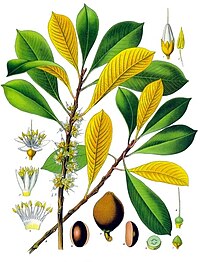
Photo from wikipedia
In the present work, direct incorporation of bioactive compounds onto the surface and interlayer of nanoclays before their incorporation into the final polymeric film was conducted, based on a green… Click to show full abstract
In the present work, direct incorporation of bioactive compounds onto the surface and interlayer of nanoclays before their incorporation into the final polymeric film was conducted, based on a green methodology developed by our group that is compatible with food packaging. This will lead to the higher thermal stability and the significant reduction of the loss of activity of the active ingredients during packaging configuration. On this basis, the essential oil (EO) components carvacrol (C), thymol (T) as well as olive leaf extract (OLE), which is used for the first time, were incorporated onto organo-modified montmorillonite (O) or inorganic bentonite (B) through the evaporation/adsorption method. The prepared bioactive nanocarriers were further mixed with low-density polyethylene (LDPE), via melt compounding, in order to prepare films for potential use as fresh fruit and vegetable packaging material. Characterization of the bioactive nanocarriers and films were performed through XRD, TGA, tensile, antimicrobial and antioxidant tests. Films with organically modified montmorillonite loaded with carvacrol (OC), thymol (OT) and olive leaf extract (OOLE) at 5% wt. showed better results in terms of mechanical properties. The films with polyethylene and organically modified montmorillonite loaded with carvacrol or thymol at 20% wt. (PE_OC20 and PE_OT20), as well as with olive leaf extract at 5 or 10 %wt., clay:bioactive substance ratio 1:0.5 and 10% compatibilizer (PE_OOLE5_MA10 and PE_OOLE10_MA10) exhibited the highest antioxidant activity. The resulting films displayed outstanding antimicrobial properties against Gram-negative Escherichia coli (E. coli) with the best results appearing in the films with 10% OC and OT.
Journal Title: Molecules
Year Published: 2023
Link to full text (if available)
Share on Social Media: Sign Up to like & get
recommendations!